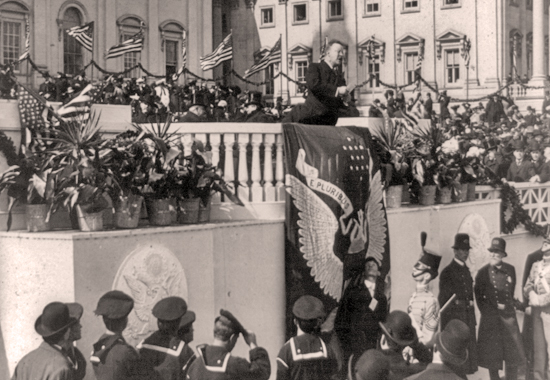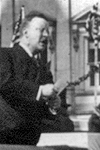|

SECOND INAUGURATION - T. ROOSEVELT
ADDRESSES THE CROWD
Theodore Roosevelt's Inaugural
Address
Go here for more about
 Theodore Roosevelt.
Theodore Roosevelt.
Go here for more about
 Roosevelt's Inaugural Address.
Roosevelt's Inaugural Address.
Go here for more about
 Roosevelt's First Inaugural Address.
Roosevelt's First Inaugural Address.
It follows the full text transcript of
Theodore Roosevelt's Inaugural Address,
delivered at his Second Inauguration in Washington D.C. -
March 4, 1905.

 |
My
fellow-citizens, |
No people on earth
have more cause to be thankful than ours, and
this is said reverently, in no spirit of
boastfulness in our own strength, but with
gratitude to the Giver of Good who has blessed
us with the conditions which have enabled us to
achieve so large a measure of well-being and of
happiness.
To us as a people
it has been granted to lay the foundations of
our national life in a new continent. We are the
heirs of the ages, and yet we have had to pay
few of the penalties which in old countries are
exacted by the dead hand of a bygone
civilization.
We have not been
obliged to fight for our existence against any
alien race; and yet our life has called for the
vigor and effort without which the manlier and
hardier virtues wither away. Under such
conditions it would be our own fault if we
failed; and the success which we have had in the
past, the success which we confidently believe
the future will bring, should cause in us no
feeling of vainglory, but rather a deep and
abiding realization of all which life has
offered us; a full acknowledgment of the
responsibility which is ours; and a fixed
determination to show that under a free
government a mighty people can thrive best,
alike as regards the things of the body and the
things of the soul.
Much has been given us, and much will rightfully
be expected from us. We have duties to others
and duties to ourselves; and we can shirk
neither. We have become a great nation, forced
by the fact of its greatness into relations with
the other nations of the earth, and we must
behave as beseems a people with such
responsibilities. Toward all other nations,
large and small, our attitude must be one of
cordial and sincere friendship.
We must show not
only in our words, but in our deeds, that we are
earnestly desirous of securing their good will
by acting toward them in a spirit of just and
generous recognition of all their rights. But
justice and generosity in a nation, as in an
individual, count most when shown not by the
weak but by the strong. While ever careful to
refrain from wrongdoing others, we must be no
less insistent that we are not wronged
ourselves. We wish peace, but we wish the peace
of justice, the peace of righteousness. We wish
it because we think it is right and not because
we are afraid. No weak nation that acts manfully
and justly should ever have cause to fear us,
and no strong power should ever be able to
single us out as a subject for insolent
aggression.
Our relations with the other powers of the world
are important; but still more important are our
relations among ourselves. Such growth in
wealth, in population, and in power as this
nation has seen during the century and a quarter
of its national life is inevitably accompanied
by a like growth in the problems which are ever
before every nation that rises to greatness.
Power invariably means both responsibility and
danger.
Our forefathers
faced certain perils which we have outgrown. We
now face other perils, the very existence of
which it was impossible that they should
foresee. Modern life is both complex and
intense, and the tremendous changes wrought by
the extraordinary industrial development of the
last half century are felt in every fiber of our
social and political being. Never before have
men tried so vast and formidable an experiment
as that of administering the affairs of a
continent under the forms of a Democratic
republic.
The conditions
which have told for our marvelous material
well-being, which have developed to a very high
degree our energy, self-reliance, and individual
initiative, have also brought the care and
anxiety inseparable from the accumulation of
great wealth in industrial centers. Upon the
success of our experiment much depends, not only
as regards our own welfare, but as regards the
welfare of mankind. If we fail, the cause of
free self-government throughout the world will
rock to its foundations, and therefore our
responsibility is heavy, to ourselves, to the
world as it is to-day, and to the generations
yet unborn.
There is no good
reason why we should fear the future, but there
is every reason why we should face it seriously,
neither hiding from ourselves the gravity of the
problems before us nor fearing to approach these
problems with the unbending, unflinching purpose
to solve them aright.
Yet, after all, though the problems are new,
though the tasks set before us differ from the
tasks set before our fathers who founded and
preserved this Republic, the spirit in which
these tasks must be undertaken and these
problems faced, if our duty is to be well done,
remains essentially unchanged.
We know that
self-government is difficult. We know that no
people needs such high traits of character as
that people which seeks to govern its affairs
aright through the freely expressed will of the
freemen who compose it. But we have faith that
we shall not prove false to the memories of the
men of the mighty past. They did their work,
they left us the splendid heritage we now enjoy.
We in our turn have an assured confidence that
we shall be able to leave this heritage unwasted
and enlarged to our children and our children's
children.
To do so we must
show, not merely in great crises, but in the
everyday affairs of life, the qualities of
practical intelligence, of courage, of
hardihood, and endurance, and above all the
power of devotion to a lofty ideal, which made
great the men who founded this Republic in the
days of Washington, which made great the men who
preserved this Republic in the days of Abraham
Lincoln.

More History
|